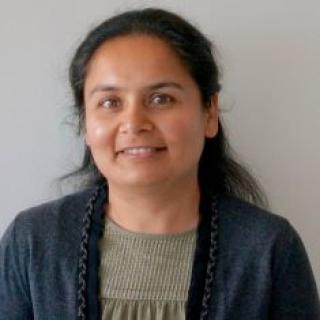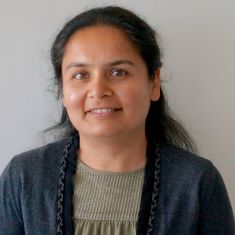
Srivandana Akshintala, MBBS, MPH
- Center for Cancer Research
- National Cancer Institute
- Building 10-CRC, Room 1-5750
- Bethesda, MD 20892
- 240-858-3448
- srivandana.akshintala@nih.gov
RESEARCH SUMMARY
Dr. Akshintala is a pediatric oncologist whose research focuses on clinical trials for pediatric solid tumors and tumor predisposition syndromes such as neurofibromatosis-associated cancers and pediatric medullary thyroid cancer. She is interested in the design and conduct of clinical studies that apply the latest advances in our understanding of tumor biology towards the development of better therapies for pediatric cancers.
Areas of Expertise
Information for Patients
Learn more about our clinical trials and the highly specialized care teams that lead them.

Srivandana Akshintala, MBBS, MPH
Clinical Trials
Research
My research has focused on clinical trials for developing novel treatments for pediatric solid tumors and pediatric tumor predisposition syndromes, including neurofibromatosis and multiple endocrine neoplasia type 2 (MEN2)-associated tumors.
I am the chair for a phase 2 trial of cabozantinib that is conducted through the Children’s Oncology Group consortium,where we are studying the activity of this drug in bone and soft-tissue sarcomas, and other solid tumors in children and young adults.
Neurofibromastosis type 1 (NF1) is an autosomal dominant disorder caused by mutations in the NF1 tumor suppressor gene. Plexiform neurofibromas are benign nerve sheath tumors seen in NF1 that can cause severe morbidities and have the potential for transformation to malignant peripheral nerve sheath tumors (MPNST), an aggressive sarcoma with poor outcomes. My research has focused on the analysis of plexiform neurofibroma growth using volumetric MRI measurements, and the identification of precursors for malignant transformation in plexiform neurofibroma based on imaging and growth characteristics. The overall goal of my projects is to help guide the design of meaningful treatment trials for NF1-associated plexiform neurofibroma, and to identify precursors of malignant transformation to help in early diagnosis and potential prevention of MPNST.
MEN2 is a rare cancer predisposition syndrome caused by a germline activating mutation in the RET proto-oncogene.It is characterized by childhood medullary thyroid cancer (MTC), pheochromocytoma, and other non-tumor manifestations. There are no curative treatments for patients with advanced MTC that cannot be removed completely by surgery. I developed a natural history trial of MEN2-associated MTC with the goal of better understanding the biology, natural history, and mechanisms of resistance to targeted therapies in this rare disease.
Publications
- Bibliography Link
- View Dr. Akshintala's PubMed Summary.
Longitudinal evaluation of peripheral nerve sheath tumors in neurofibromatosis type 1: Growth analysis of plexiform neurofibromas and distinct nodular lesions
A Systematic Review of Pediatric Phase I Trials in Oncology: Toxicity and Outcomes in the Era of Targeted Therapies
Pheochromocytoma in Children and Adolescents With Multiple Endocrine Neoplasia Type 2B
Outcomes of Children and Adolescents with Advanced Hereditary Medullary Thyroid Carcinoma Treated with Vandetanib
Phase 1 trial and pharmacokinetic study of the oral platinum analog satraplatin in children and young adults with refractory solid tumors including brain tumors
Biography

Srivandana Akshintala, MBBS, MPH
Dr. Srivandana Akshintala is a board-certified pediatrician and pediatric oncologist who earned her medical degree from Maulana Azad Medical College, India, and completed a pediatric residency at the State University of New York-Downstate Medical Center. Following a pediatric hematology/oncology fellowship at Children’s National Medical Center and a research fellowship at the National Cancer Institute, Dr. Akshintala served as faculty in the Department of Pediatrics at New York University School of Medicine. She is currently an Assistant Research Physician working in the Pediatric Oncology Branch at the National Cancer Institute under the mentorship of Dr. Brigitte Widemann.
